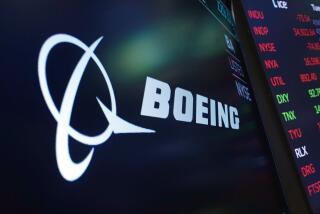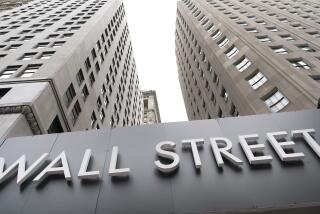A Fighting Chance for Defense Stocks?
- Share via
Buy on the buildup, sell on the war.
Defense stocks surged from 2000 to 2002 as Pentagon spending for new weapons ratcheted up and talk of war in Iraq swelled. But starting last summer, the stocks sharply retreated even as the war drew closer. And analysts and industry executives said Thursday that they don’t see the fighting itself giving the shares a major lift.
“If the war is short, it won’t have much of an impact” on new Pentagon spending, said Craig Fraser, an analyst with the credit-rating firm Fitch Inc.
Added a defense company official, who asked not to be identified: “None of us expects a bump because of this conflict,”
Many investors believe the stocks of companies that build jet fighters, bombs, satellites and naval vessels remain too pricey.
They’re also turned off by the White House’s proposal for a smaller growth rate in the Defense Department’s budget, and by pension issues and other internal problems at several major defense contractors.
Key defense contractors include Lockheed Martin Corp., Boeing Co., Northrop Grumman Corp., Raytheon Co. and General Dynamics Corp., which together have tens of thousands of employees in California.
All five stocks fell Thursday, although some of their weaponry already has been fired in the Iraq war. Raytheon’s Tomahawk cruise missiles helped launch the U.S. attack, and the latest version of Raytheon’s Patriot antimissile system, which includes Lockheed Martin’s PAC-3 missile, shot down two Iraqi missiles fired at U.S. bases in Kuwait.
Overall, the defense industry’s market value has been slashed by a third since its peak last May and many of the stocks have traded at 52-week lows recently. On Thursday the American Stock Exchange’s index of 15 defense stocks fell 7.05 points, or 1.5%, to 454.09.
Additional war spending would focus mostly on fuel, food and transportation, not on new purchases of big-ticket gear that by itself would give investors reason to bid the stocks higher, analysts said.
Indeed, some suggest that delivering a quick, lethal blow to Iraq would point up the existing might of the companies’ weaponry, sending a signal that the U.S. arsenal doesn’t need another major spending boost, at least not right away.
“If the U.S. can destroy Iraqi resistance with a relatively small portion of its combat power, what is the remainder needed for?” defense analyst Byron Callan of Merrill Lynch & Co. asked rhetorically in a bulletin to clients Wednesday.
If the war goes as planned, U.S. spending also is likely to focus on helping rebuild Iraq and its infrastructure.
And with the Bush administration already facing budget deficits, that could crowd out substantially higher spending for new helicopters, tanks and bombers, analysts said.
Still, some believe that the long-term future remains bright for the defense industry, regardless of Iraq.
“The war is a small part of the total picture,” said Paul Nisbet, president of JSA Research Inc. in Newport, R.I. “The requirement is to refurbish the U.S. weaponry that atrophied in the last decade.”
George Shapiro and Robert Spingarn, analysts at Salomon Smith Barney, last week boosted their rating on defense stocks, arguing the shares will benefit from defense budgets that should “grow at least in line” with gains in the overall U.S. economy. “We now believe the industry will shortly begin a several-year period of out-performance” of the broader market, they said, adding their top picks are Century City-based Northrop Grumman and Lockheed Martin, headquartered in Bethesda, Md.
Lockheed Martin fell $1.45 to $46.85 a share Thursday, Boeing slipped 13 cents to $27.82, and Northrop lost $2.50 to $84.95. Raytheon fell 28 cents to $28.07, and General Dynamics dropped $1.34 to $57.08. All trade on the New York Stock Exchange.
More to Read
Inside the business of entertainment
The Wide Shot brings you news, analysis and insights on everything from streaming wars to production — and what it all means for the future.
You may occasionally receive promotional content from the Los Angeles Times.











